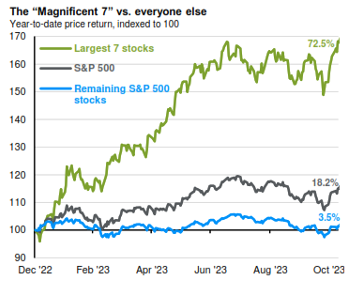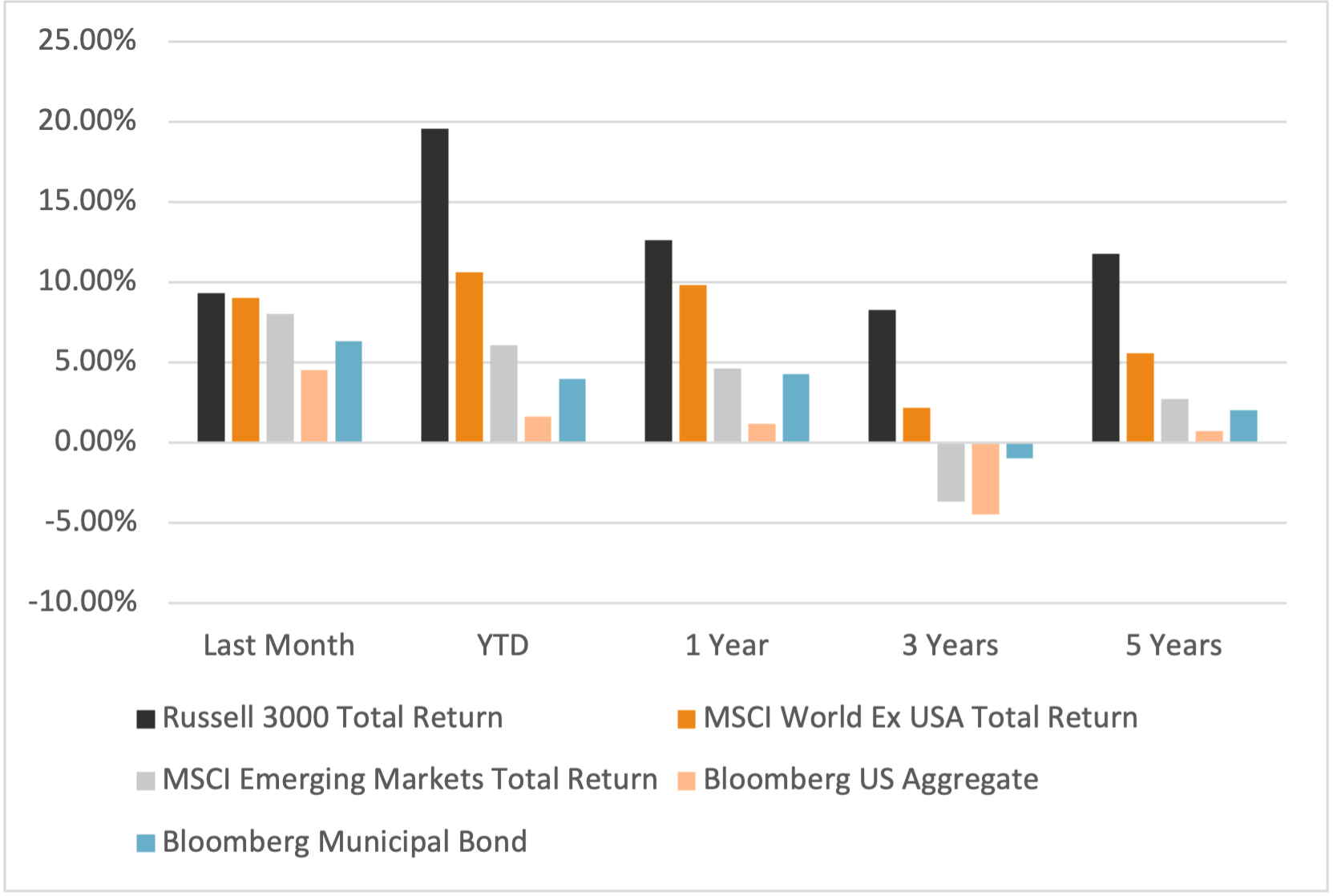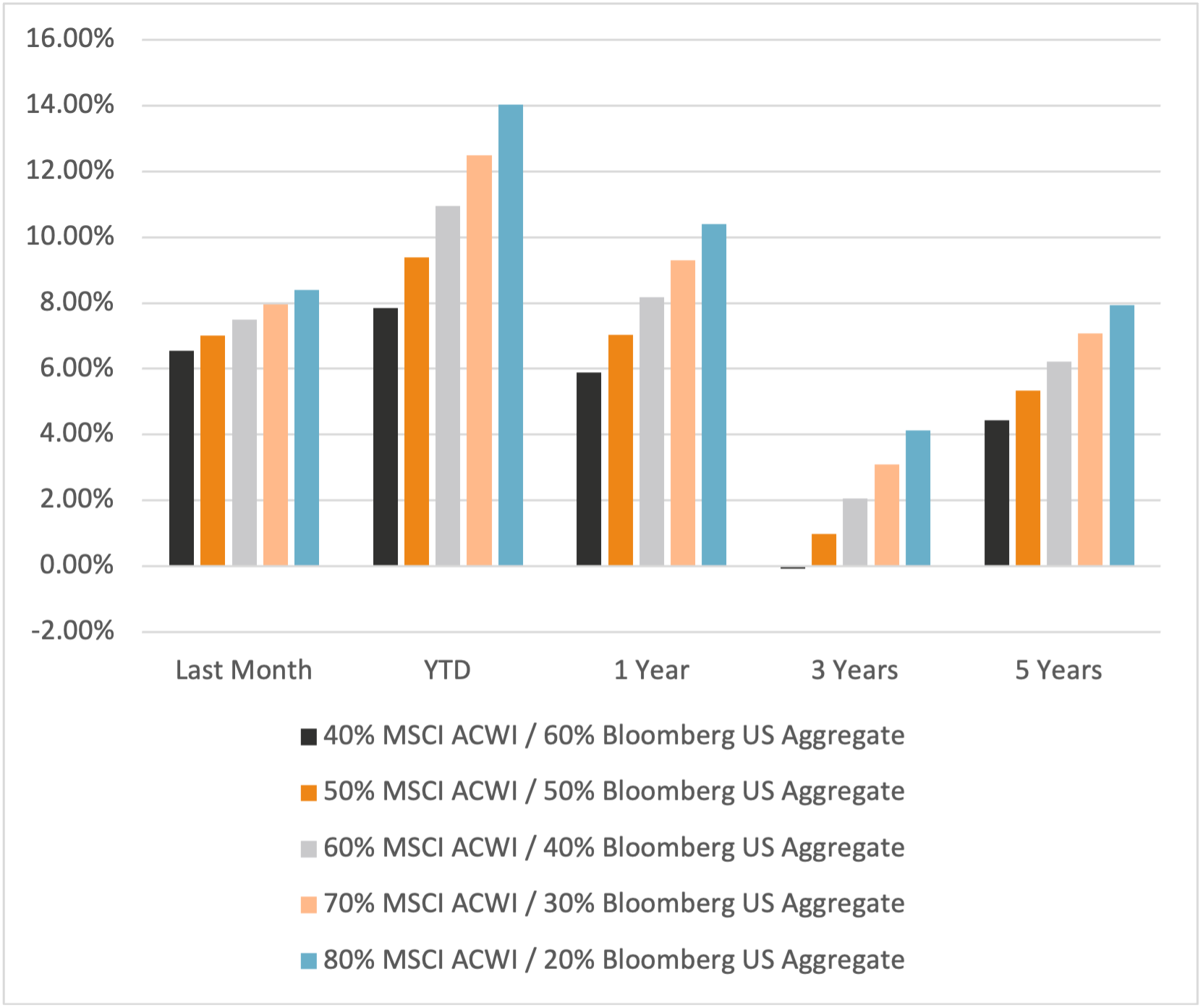Please find our most recent market review below. We hope these perspectives are valuable to you.
– The AdvicePeriod Team
Economy Slows, Markets Soar
Slowing U.S. job growth tamped down inflation fears and sent longer-term interest rates tumbling. U.S. stocks soared, led by growth stocks, while international stocks rose by a similar amount. Federal Reserve officials said it’s too early to declare victory but generally supported the idea that further hikes may not be necessary.
Key Observations
- The S&P 500 gained 9% in November and is up more than 20% year to date.
- Small-cap stocks rose 9% and mid-cap stocks rose 10% for the month.
- Bonds ended the month up about 4.5%.
- International developed and emerging markets rose 9% and 8%, respectively.

The stock market had a great month in November as markets soared in reaction to a slowing economy, which should allow the Federal Reserve to end its rate-hiking cycle. The S&P 500 rose about 9% and is now up more than 20% year to date. The Bloomberg U.S. Aggregate Bond Index was up 4.5% for the month, while the 10-year Treasury yield tumbled. Yields on the 2-year Treasury declined at the end of November, starting at 4.97% and falling to 4.56% on November 30. The 10-year Treasury yield dropped from 4.88% to 4.22%. High-yield bonds were up 4.5%. Small- and mid-cap stocks rose 9% and 10%, respectively. International markets ended the month up 9%.
Soft Landing in the Cards?
Job growth slowed sharply in October, a sign the U.S. economy is cooling. Employers added just 150,000 jobs in October, half the prior month’s gain and the smallest monthly increase since June, according to the Labor Department. The unemployment rate rose to 3.9%, up a half-point since April, and wage growth slowed. If the slower hiring trend persists, the Fed is likely to end its historic interest rate increases—the swiftest pace of increases in 40 years. The jobs report helped ignite a powerful rally in financial markets as stock prices rose and bond yields fell. Employers are pulling back in light of high interest rates, persistent inflation and wars in Europe and the Middle East.
Home sales fell in October to a fresh 13-year low as high interest rates and home prices continued to slow demand. Home affordability sits near its lowest level in decades, pushing many buyers out of the market. Existing-home sales, which make up most of the housing market, decreased 4.1% in October from the prior month to a seasonally adjusted annual rate of 3.79 million, the lowest rate since August 2010, according to the National Association of Realtors. October sales fell 14.6% from a year earlier.
Consumer spending rose just 0.2% in October, down sharply from a 0.7% rise in September, according to the Commerce Department. The October reading marked the slowest growth since May. The combination of stagnant income growth, high interest rates and prices, as well as dwindling stimulus payments and savings, is eroding Americans’ ability to continue spending as briskly as they did during the summer months.
U.S. retail sales fell 0.1% in October from a month earlier, according to the Commerce Department. That is the first decline since March and follows a 0.9% increase in September. The figures suggest that the economy is cooling after strong growth for much of this year. Americans spent at a torrid pace over the summer. That spending propelled the economy to accelerate to a nearly 5% growth rate. Now growth is slowing sharply, which takes additional pressure off the Fed to continue its interest rate hikes to slow the economy.
Overall consumer prices were flat last month and rose just 3.2% from a year earlier, according to the Labor Department. Overall inflation peaked at 9.1% in June 2022. Core inflation, which excludes volatile food and energy prices, increased at an annual rate of just 2.8% for the five months ended in October, down from 5.1% during the first five months of the year. Prices for durable goods have fallen on a year-over-year basis for five straight months, which could ease overall inflation’s return to the Fed’s 2% target, perhaps as early as next year. Factors associated with the pandemic, such as product shortages and snarled supply chains, have been easing. The drop in durable goods prices has helped bring down core inflation, which excludes volatile food and energy categories, to 3.5% in October from 5.5% in September 2022 as measured by the personal consumption expenditures price index, the Fed’s preferred inflation gauge.
Diversify Beyond the Big Seven
If your portfolio is overweight the so-called Big Seven tech stocks (Apple, Amazon, Alphabet, Meta, Microsoft, Nvidia, Tesla), it may be time for a weight loss plan. The Big Seven now account for 29% of the S&P 500. That’s a lot of concentration in seven names. We believe the future is very bright for these companies, but they do trade at an average 53 times trailing 12-month earnings. In 2000, the four most popular tech stocks—Intel, Cisco, Dell and Microsoft—traded at 62 times earnings just before those stocks experienced significant declines when the tech bubble burst. The Big Seven stocks are up over 70% so far this year, while the remaining S&P 500 stocks are up just 3.5%.
All these companies seem to have a bright future and, especially with the recent advances associated with artificial intelligence, their growth may continue for years to come. But we also believe it is prudent to maintain broad diversification by owning an appropriate number of stocks in areas that have not appreciated so dramatically, such as small caps, mid-caps, value stocks and international stocks. You may give up some of the gains if current trends continue, but you will also be taking less risk if their popularity suddenly turns. After all, it probably isn’t a good idea to bet your financial future on seven stocks.

Source: JP Morgan, November 30, 2023.
Outlook
At the beginning of this year, the average forecast from Wall Street economists and strategists called for a decline in the stock market—the first time this group predicted a decline in over 20 years. Through the end of November, the S&P 500 was up over 20% for the year. The lesson is clear: Investment decisions should be based on sound investment principles, not short-term predictions. For next year, our advice is to ignore the pundits and predictors and instead focus on the factors you can control. Maintain broad diversification by not positioning too much of your fixed income investments in short-term maturities, which exposes your portfolio to reinvestment risk. Avoid being overexposed to any one segment of the stock market, such as popular technology stocks. And most of all, tune out the noise of what is most likely to be a raucous election season by not playing politics with your portfolio. By focusing on the factors you can control—the diversification of your portfolio, the quality of your investments and your emotions and reactions to short-term events—the odds of long-term success will increase. In the words of Benjamin Graham, “Investing isn’t about beating others at their game. It’s about controlling yourself at your own game.”
Disclosures:
This market commentary is meant for informational and educational purposes only and does not consider any individual personal considerations. As such, the information contained herein is not intended to be personal investment advice or recommendation. References to specific companies, asset classes, and financial markets are for illustrative purposes only. Diversification is an investment strategy designed to help manage risk but cannot ensure a profit or protect against loss in a declining market. Please consult a financial professional before making any financial-related decisions.
The commentary represents an assessment of the market environment through November 2023. The views and opinions expressed may change based on the market or other conditions. The forward-looking statements are based on certain assumptions, but there can be no assurance that forward-looking statements will materialize. This commentary was written and provided by an unaffiliated third party; we cannot guarantee the accuracy or completeness of any statements or data contained herein.
Indexes are unmanaged and cannot be directly invested into. Past performance is no indication of future results. Investing involves risk and the potential to lose principal.
AdvicePeriod is another business name and brand utilized by both Mariner, LLC and Mariner Platform Solutions, LLC, each of which is an SEC registered investment adviser. Registration of an investment adviser does not imply a certain level of skill or training. Each firm is in compliance with the current notice filing requirements imposed upon SEC registered investment advisers by those states in which each firm maintains clients. Each firm may only transact business in those states in which it is notice filed or qualifies for an exemption or exclusion from notice filing requirements. Any subsequent, direct communication by an advisor with a prospective client shall be conducted by a representative that is either registered or qualifies for an exemption or exclusion from registration in the state where the prospective client resides. For additional information about Mariner, LLC or Mariner Platform Solutions, LLC, including fees and services, please contact us utilizing the contact information provided herein or refer to the Investment Adviser Public Disclosure website (www.adviserinfo.sec.gov). Please read the disclosure statement carefully before you invest or send money.
For additional information as to which entity your adviser is registered as an investment adviser representative, please refer to the Investment Adviser Public Disclosure website (www.adviserinfo.sec.gov) or the Form ADV 2B provided to you. Investment adviser representatives of Mariner, LLC dba Mariner Wealth Advisors and dba AdvicePeriod are generally employed by Mariner Wealth Advisors, LLC. Investment adviser representatives of Mariner Platform Solutions, LLC dba AdvicePeriod, are independent contractors.
Index Definitions: The S&P 500 is a capitalization-weighted index designed to measure the performance of the broad domestic economy through changes in the aggregate market value of 500 stocks representing all major industries. Russell 2000 consists of the 2,000 smallest U.S. companies in the Russell 3000 index. MSCI EAFE is an equity index which captures large and mid-cap representation across Developed Markets countries around the world, excluding the U.S. and Canada. The index covers approximately 85% of the free float-adjusted market capitalization in each country. MSCI Emerging Markets captures large and mid-cap representation across Emerging Markets countries. The index covers approximately 85% of the free-float adjusted market capitalization in each country. Bloomberg U.S. Aggregate Index covers the U.S. investment grade fixed rate bond market, with index components for government and corporate securities, mortgage pass-through securities, and asset-backed securities. Bloomberg U.S. Corporate High Yield Index covers the universe of fixed rate, non-investment grade debt. Eurobonds and debt issues from countries designated as emerging markets (sovereign rating of Baa1/BBB+/BBB+ and below using the middle of Moody’s, S&P, and Fitch) are excluded, but Canadian and global bonds (SEC registered) of issuers in non-EMG countries are included. FTSE NAREIT Equity REITs Index contains all Equity REITs not designed as Timber REITs or Infrastructure REITs. Bloomberg Commodity Index is calculated on an excess return basis and reflects commodity futures price movements. The index rebalances annually weighted 2/3 by trading volume, and 1/3 by world production and weight-caps are applied at the commodity, sector, and group level for diversification.
Does past performance matter?
Major Market Index Returns
Period Ending 12/1/2023
Multi-year returns are annualized.


Mix Index Returns
Global Equity / US Taxable Bonds


Indexes are unmanaged and cannot be directly invested into. Past performance is no indication of future results. Investing involves risk and the potential to lose principal.
The Russell 3000 Index is a United States market index that tracks the 3000 largest companies. MSCI Emerging Markets Index is a broad market cap-weighted Index showing the performance of equities across 23 emerging market countries defined as emerging markets by MSCI. MSCI ACWI ex-U.S. Index is a free-float adjusted market capitalization-weighted index that is designed to measure the equity market performance of developed and emerging markets excluding companies based in the United States. Bloomberg U.S. Aggregate Bond Index represents the investment-grade, U.S. dollar-denominated, fixed-rate taxable bond market, including Treasuries, government-related and corporate securities, as well as mortgage and asset-backed securities. Bloomberg Municipal Index is the US Municipal Index that covers the US dollar-denominated long-term tax-exempt bond market. The index has four main sectors: state and local general obligation bonds, revenue bonds, insured bonds, and prerefunded bonds.




July 2024 Market Commentary